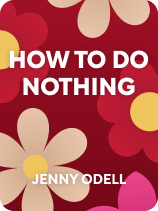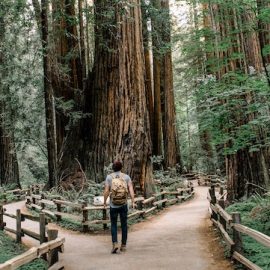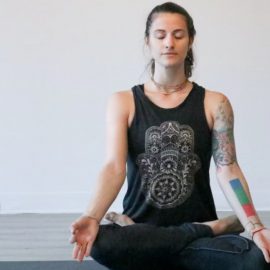

This article is an excerpt from the Shortform book guide to "How to Do Nothing" by Jenny Odell. Shortform has the world's best summaries and analyses of books you should be reading.
Like this article? Sign up for a free trial here.
How can you keep life’s experiences from being chaotic? What’s #NOMO? Whom do you know better—your neighbors or your Twitter followers?
The perceived need to constantly be doing something is overwhelming. You might feel you have to use all your available time to advance your career or accomplish something productive. Jenny Odell says this feeling is created by broader social and economic forces.
Read more for several How to Do Nothing quotes that help you understand Odell’s argument that devoting attention to “non-productive” things is a form of healing and social activism.
How to Do Nothing Quotes
Odell’s suggestion of “doing nothing” refers not to inaction but rather to actions that don’t have clear or immediate value, like sitting in nature, making art for its own sake, or learning about an abstract topic that interests you. We’ve collected five How to Do Nothing quotes that capture the essence of the book and included some context to help you grasp Odell’s ideas.
“My experience is what I agree to attend to. Only those items which I notice shape my mind—without selective interest, experience is an utter chaos.”
Imagine you’re visiting a beautiful natural landscape. Under the attention economy, you might be tempted to take pictures, post them on social media, and then move on—using your time efficiently to get attention. But, if you do nothing instead and just sit and watch, you can gain a far more profound appreciation of the natural beauty: You’ll notice details you otherwise would have missed and see how different parts of the landscape, like animals, plants, and natural features, interact. “Doing nothing” therefore gives you a deeper understanding of the scene and contextualizes it within a broader ecosystem.
“I suggest that we reimagine #FOMO as #NOMO—the necessity of missing out.”
Odell believes that, to resist the attention economy, you must do nothing. Doing nothing refers to two major mindset shifts:
- Refusing to engage with the attention economy
- Devoting time to connecting with the world around you
Essentially, doing nothing refers, not to inaction, but rather to devoting time and attention to things you care about that are hard for capitalism and the attention economy to monetize. Odell argues that doing nothing is an effective method of resistance because it actively refutes the mindset of the attention economy, instead of just trying to get away from the circumstances it creates. It also helps address both main consequences of the attention economy: reduced context and social atomization.
“Let’s not forget that, in a time of increasing climate-related events, those who help you will likely not be your Twitter followers; they will be your neighbors.”
Odell recommends taking time to get to know your neighbors. This allows you to become a part of a local community, even one as small as your apartment building or block, which in turn helps prevent atomization. As well as making you less lonely, knowing your neighbors makes it easier for you to organize around important issues and support one another. This could mean something as simple as knowing someone who’ll lend you a cup of sugar or as complex as having a group of tenants who can collectively pressure their landlord to make a much-needed repair.
“In a situation where every waking moment has become the time in which we make our living, and when we submit even our leisure for numerical evaluation via likes on Facebook and Instagram, constantly checking on its performance like one checks a stock, monitoring the ongoing development of our personal brand, time becomes an economic resource that we can no longer justify spending on ‘nothing.'”
Odell explains that, in the 1980s, corporate deregulation—the elimination of laws and rules regarding corporate conduct—as well as the loss of labor power allowed the wealthy and major corporations to monetize much larger portions of people’s lives. The cutting of social safety nets and stagnation of wages also put people in a situation where they couldn’t say no to more work or worse working conditions without risking their livelihoods. This economic shift led to a mindset shift: People had to start thinking of their time and attention in terms of monetary value.
“To stand apart is to take the view of the outsider without leaving, always oriented toward what it is that you would have left. It means not fleeing your enemy, but knowing your enemy, which turns out not to be the world, but the channels through which you encounter it day-to-day.”
One form of resistance to the attention economy that Odell critiques is the leaving of society entirely—going “off the grid” in some kind of isolated location or commune. This common fantasy of running away is impractical and self-defeating, argues Odell. Trying to live outside of and separate from our capitalist system is nearly impossible, as it requires total self-sufficiency.
Furthermore, running away from society won’t necessarily get rid of the attention economy mindset of viewing time and attention in terms of monetary value—you can still bring these deep-seated beliefs with you and apply them to your new community. Lastly, Odell argues that any benefit of running away isn’t worth having to sever all connections with the people, environment, and history of your local community.

———End of Preview———
Like what you just read? Read the rest of the world's best book summary and analysis of Jenny Odell's "How to Do Nothing" at Shortform.
Here's what you'll find in our full How to Do Nothing summary:
- Why we always feel the need to be doing something
- Why you should devote time to non-productive activities
- How to engage with the world in a deeper, more satisfying way






